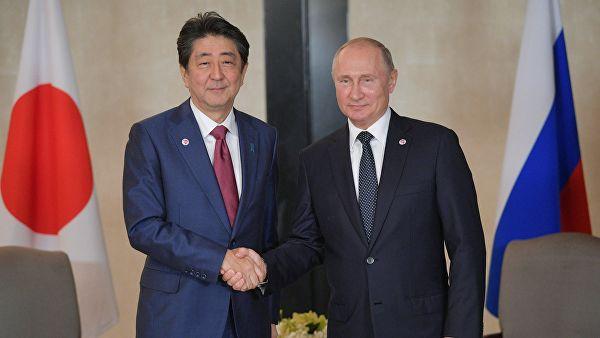Russian President Vladimir Putin and Japanese Prime Minister Shinzo Abe on Tuesday failed to reach a major consensus on decades-old territorial disputes that have mired peace treaty talks, Trend reported citing Xinhua.
At a news briefing following their 25th meeting in Moscow, Putin said Russia and Japan have "meticulous work ahead" on creating conditions for reaching a peace treaty.
"We have once again confirmed our interest in signing this document ... The solution will have to be acceptable for the peoples of Russia and Japan," he told reporters.
Abe said at the briefing that he and Putin discussed the peace treaty issue "without hiding anything from each other."
"President Putin and I salute the start of concrete talks between our foreign ministers last week ... The discussions were frank and serious," he said.
Abe said the two leaders agreed to continue joint work to look for a mutually acceptable solution.
Russian Foreign Minister Sergei Lavrov and his Japanese counterpart Taro Kono held the first round of negotiations on Jan. 14 in Moscow and they reported barren results to Putin and Abe during Tuesday's meeting.
Lavrov and Kono will hold the next round of talks on the sidelines of the Munich Security Conference next month, according to Abe.
"To settle the issue unsolved for more than 70 years after the end of World War II is difficult, but we have to do it," the Japanese leader said.
Russia and Japan have not signed a post-World War II peace treaty due to their rivaling claims over four Pacific islands, which are known as the Southern Kurils in Russia and the Northern Territories in Japan.
The Soviet army took the four islands in the final days of World War II. After the collapse of the Soviet Union, they were incorporated into Russia.
According to a joint declaration signed in 1956, the then Soviet Union agreed to return two of the islands provided a bilateral peace treaty is signed, while Japan refused to sign such an agreement, insisting on the return of all four islands.
However, Moscow has recently toughened its stance, demanding that the peace treaty talks be based on Japan's full recognition of the aftermath of World War II, including Russian sovereignty over all the disputed islands.
Last week, Lavrov told visiting Kono that "the sovereignty over the four islands is not subject to discussion. They are Russian territory." The two top diplomats avoided a joint press conference.
"The parties in this difficult situation will save faces and maintain a positive attitude. But one should not expect any significant progress in the dialogue," said Kristina Voda, research fellow of the Institute of World Economy and International Relations under the Russian Academy of Sciences.
She believes that if Russia and Japan stick to their fundamental positions, the problem will remain without a solution.
"Positions are too different. They are enshrined in legislation and rooted in the public consciousness of both countries," she said.
The negotiations have reached an impasse and the space for compromise is very small, said Valery Kistanov, head of the Center for Japanese Studies at the Far Eastern Studies Institute under the Russian Academy of Sciences.
According to Putin, Russia-Japan trade increased 18 percent to nearly 20 billion U.S. dollars in the January-November period of last year.
"It will be possible, in the coming years, to set a goal to increase Russia-Japan trade by at least 50 percent to 30 billion U.S. dollars," Putin said at Tuesday's briefing.
Voda said Russia's desire to do business with Japan is pulling the two countries together despite all the rifts.
"The Russian side is seeking new resources and investment in its Far East. Russia needs investment and technology from Japan, China and South Korea," she said.
Putin and Abe also agreed on Tuesday to continue efforts to organize joint economic activities on the disputed islands in five spheres -- aquaculture, greenhouses, wind energy, tourism and waste processing.
They asked interested parties and organizations to launch joint economic activities there as soon as possible.
But Kistanov has doubts over the future of such partnership as "everything depends on the issue of what legal basis will be used."
The Japanese are not willing to act on the basis of Russian legislation since this would mean Japan's indirect recognition of Russian sovereignty over the islands, he said, adding that the Russians face a similar issue.






